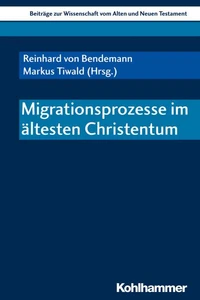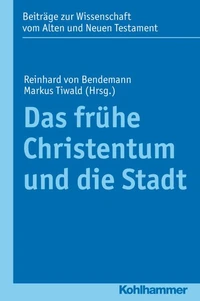Early Christian Encounters with Town and Countryside. Essays on the Urban and Rural Worlds of Early Christianity
Par : , ,Formats :
Disponible dans votre compte client Decitre ou Furet du Nord dès validation de votre commande. Le format PDF est :
- Compatible avec une lecture sur My Vivlio (smartphone, tablette, ordinateur)
- Compatible avec une lecture sur liseuses Vivlio
- Pour les liseuses autres que Vivlio, vous devez utiliser le logiciel Adobe Digital Edition. Non compatible avec la lecture sur les liseuses Kindle, Remarkable et Sony
 , qui est-ce ?
, qui est-ce ?Notre partenaire de plateforme de lecture numérique où vous retrouverez l'ensemble de vos ebooks gratuitement
Pour en savoir plus sur nos ebooks, consultez notre aide en ligne ici
- Nombre de pages415
- FormatPDF
- ISBN978-3-647-56494-4
- EAN9783647564944
- Date de parution12/04/2021
- Protection num.pas de protection
- Taille64 Mo
- Infos supplémentairespdf
- ÉditeurVandenhoeck & Ruprecht
Résumé
Ever since Jesus walked the hills of Galilee and Paul travelled the roads of Asia Minor and Greece, Christianity has shown a remarkable ability to adapt itself to various social and cultural environments. Recent research has demonstrated that these environments can only be very insufficiently termed as "rural" or "urban". Neither was Jesus' Galilee only rural, nor Paul's Asia only "urban". On the background of ongoing research on the diversity of social environments in the Early Empire, this volume will focus on various early Christian "worlds" as witnessed in canonical and non-canonical texts.
How did Early Christians experience and react to "rural" and "urban" life? What were the mechanisms behind this adaptability? Papers will analyze the relation between urban Christian beginnings and the role of the rural Jesus-tradition. In what sense did the image of Jesus, the "Galilean village Jew", change when his message was carried into the cities of the Mediterranean world from Jerusalem to Athens or Rome? Papers will not only deal with various personalities or literary works whose various attitudes towards urban life became formative for future Christianity.
They will also explore the different local milieus that demonstrate the wide range of Christian cultural perspectives.
How did Early Christians experience and react to "rural" and "urban" life? What were the mechanisms behind this adaptability? Papers will analyze the relation between urban Christian beginnings and the role of the rural Jesus-tradition. In what sense did the image of Jesus, the "Galilean village Jew", change when his message was carried into the cities of the Mediterranean world from Jerusalem to Athens or Rome? Papers will not only deal with various personalities or literary works whose various attitudes towards urban life became formative for future Christianity.
They will also explore the different local milieus that demonstrate the wide range of Christian cultural perspectives.
Ever since Jesus walked the hills of Galilee and Paul travelled the roads of Asia Minor and Greece, Christianity has shown a remarkable ability to adapt itself to various social and cultural environments. Recent research has demonstrated that these environments can only be very insufficiently termed as "rural" or "urban". Neither was Jesus' Galilee only rural, nor Paul's Asia only "urban". On the background of ongoing research on the diversity of social environments in the Early Empire, this volume will focus on various early Christian "worlds" as witnessed in canonical and non-canonical texts.
How did Early Christians experience and react to "rural" and "urban" life? What were the mechanisms behind this adaptability? Papers will analyze the relation between urban Christian beginnings and the role of the rural Jesus-tradition. In what sense did the image of Jesus, the "Galilean village Jew", change when his message was carried into the cities of the Mediterranean world from Jerusalem to Athens or Rome? Papers will not only deal with various personalities or literary works whose various attitudes towards urban life became formative for future Christianity.
They will also explore the different local milieus that demonstrate the wide range of Christian cultural perspectives.
How did Early Christians experience and react to "rural" and "urban" life? What were the mechanisms behind this adaptability? Papers will analyze the relation between urban Christian beginnings and the role of the rural Jesus-tradition. In what sense did the image of Jesus, the "Galilean village Jew", change when his message was carried into the cities of the Mediterranean world from Jerusalem to Athens or Rome? Papers will not only deal with various personalities or literary works whose various attitudes towards urban life became formative for future Christianity.
They will also explore the different local milieus that demonstrate the wide range of Christian cultural perspectives.






